IMPRISONED BY ART
Most literary intellectuals have as much business writing about life behind bars as incarcerated felons have teaching text analysis. In the last few months, Los Angeles has hosted two plays written by playwrights who have spent time, and set stories, in prisons. Miguel Pinero did his time as a thief and drug addict. Leonard Manzella served as a therapist. One of them wrote a good play. The other wrote a play with aspirations to be a TV episode.
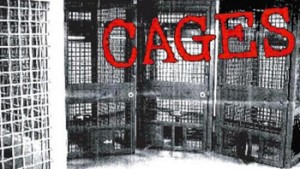 Pinero’s 1974 Short Eyes, rarely staged since its 1984 New York revival, recently closed after Urban Theatre Movement’s massively successful extended run at the Los Angeles Theatre Center. Trapping audiences in Geronimo Guzman’s impressively horrific set and Juvencio Segura’s nerve-wracking soundscape, this production mined much of the value from Pinero’s work. Julian Acosta’s muscular, breakneck pacing swept playgoers on a hideous journey into the bleak heart of two justice systems: the official and the underground. Concerned with the decision by inmates to murder an accused child molester, the play tells a compelling story almost secondary to its interest in the minutiae of daily life under guard. Prisoners rap, bicker and fawn; officers threaten and cajole; nobody gets anywhere but deeper into trouble with a world that ultimately will claim all their lives, if not their souls.
Pinero’s 1974 Short Eyes, rarely staged since its 1984 New York revival, recently closed after Urban Theatre Movement’s massively successful extended run at the Los Angeles Theatre Center. Trapping audiences in Geronimo Guzman’s impressively horrific set and Juvencio Segura’s nerve-wracking soundscape, this production mined much of the value from Pinero’s work. Julian Acosta’s muscular, breakneck pacing swept playgoers on a hideous journey into the bleak heart of two justice systems: the official and the underground. Concerned with the decision by inmates to murder an accused child molester, the play tells a compelling story almost secondary to its interest in the minutiae of daily life under guard. Prisoners rap, bicker and fawn; officers threaten and cajole; nobody gets anywhere but deeper into trouble with a world that ultimately will claim all their lives, if not their souls.
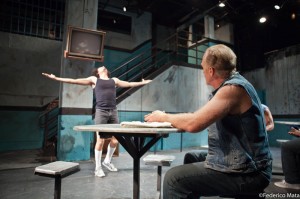 Short Eyes has not mellowed with age – it still brutalizes anyone who sees it; but neither have the years been kind to its shortcomings. Walter Kerr famously said of its initial production that the script was “not yet freed of its initial debt to life,” and one wishes this early effort could be cleaned up by its matured author. But Miguel Pinero is dead, and some moments fall flatter now, probably, than they did nearly forty years ago; a prisoner’s crying out during a riot, “Is this really us?”, struck me as not only precious but absurdly so.
Short Eyes has not mellowed with age – it still brutalizes anyone who sees it; but neither have the years been kind to its shortcomings. Walter Kerr famously said of its initial production that the script was “not yet freed of its initial debt to life,” and one wishes this early effort could be cleaned up by its matured author. But Miguel Pinero is dead, and some moments fall flatter now, probably, than they did nearly forty years ago; a prisoner’s crying out during a riot, “Is this really us?”, struck me as not only precious but absurdly so.
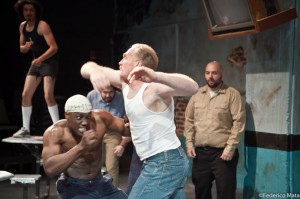 The play has also fallen ironic victim to its own influence on portrayals of prison life; as among the first of a more realistic series of 1970’s prison depictions (including Edward Bunker’s novel Animal Factory and his screenplay for Straight Time), Short Eyes has educated more writers on how to represent prison slang and behavior than have actual prisons. So by now, we have seen many versions of this play’s sexual predation, racial segregation and alienation, many of them benefitting from a literary game of telephone from which Short Eyes could not profit precisely because it came first.
The play has also fallen ironic victim to its own influence on portrayals of prison life; as among the first of a more realistic series of 1970’s prison depictions (including Edward Bunker’s novel Animal Factory and his screenplay for Straight Time), Short Eyes has educated more writers on how to represent prison slang and behavior than have actual prisons. So by now, we have seen many versions of this play’s sexual predation, racial segregation and alienation, many of them benefitting from a literary game of telephone from which Short Eyes could not profit precisely because it came first.
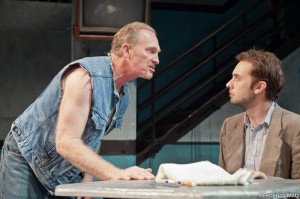 This production also could have benefited from a more consistently experienced and educated cast. As young companies are wont to do, UTM clearly styles itself as a training ground where young actors may learn from seasoned talents. No doubt, any actor would gain by working with giants like Carl Crudup, whose work in this show was one of the best reasons to see it or any play last year; or with quiet greats like Jason Manuel Olazabal and Mark Rolston, and several others in this cast who like the veteran jailbirds they portray have a wealth of background to draw upon. But to cast these actors alongside less accomplished performers does a disservice to the production and to the audience. The young actors eventually will get better as a result; the production, however, will be limited to those actors’ growth.
This production also could have benefited from a more consistently experienced and educated cast. As young companies are wont to do, UTM clearly styles itself as a training ground where young actors may learn from seasoned talents. No doubt, any actor would gain by working with giants like Carl Crudup, whose work in this show was one of the best reasons to see it or any play last year; or with quiet greats like Jason Manuel Olazabal and Mark Rolston, and several others in this cast who like the veteran jailbirds they portray have a wealth of background to draw upon. But to cast these actors alongside less accomplished performers does a disservice to the production and to the audience. The young actors eventually will get better as a result; the production, however, will be limited to those actors’ growth.

Leonard Manzella’s Cages, in its world premiere, had the benefit of a more uniformly excellent cast; alas, in service of a vastly inferior play. Manzella has spent the past thirty years counseling and treating addicts and the mentally ill, much of that time with the incarcerated. He is to be commended for this work. As a dramatist of the American prison experience, however, he boasts none of Miguel Pinero’s instincts and few of his chops.
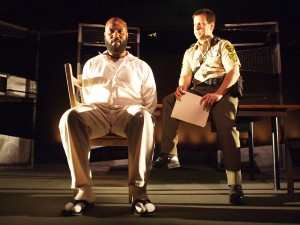
Cages concerns a jaded psychologist’s spiritual rebirth. Through his work with the prison inmates – where he has been rehired following his negligent failure to prevent a suicide – Dr. Morri (John Nielsen) is supposed to undergo the sort of dynamic personal growth so beloved of mediocre playwrights. This tale, fraught as it is with stereotyped characters like the sadistic prison guard (Matt Kirkwood), the murderous altar boy (Daniel V. Graulau), and the idealistic foil (Arlene Santana) to the protagonist’s world-weary alcoholic, stands little chance of providing catharsis to anyone who has ever seen any story dealing with criminal psychology or personal redemption. When the stock drama plot strays unhappily into tired thriller territory, all Manzella’s good intentions seem to have been subverted by an appetite for formula melodrama.
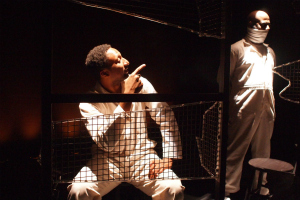 Even this play might be more persuasive if director Jon Lawrence Rivera had not removed the single, admittedly trite, source of suspense in this saga. Characters in the play are kept doubly imprisoned (in special cages even behind the regular prison bars, ostensibly because of their violent and unpredictable natures), but Mr. Rivera directed the excellent actors playing these murderers to wander in and out of their cages, thereby robbing any possible tension from the moment, telegraphed by the script, when the protagonist unlocks the most dangerous man alive for a face-to-face heart-to-heart.
Even this play might be more persuasive if director Jon Lawrence Rivera had not removed the single, admittedly trite, source of suspense in this saga. Characters in the play are kept doubly imprisoned (in special cages even behind the regular prison bars, ostensibly because of their violent and unpredictable natures), but Mr. Rivera directed the excellent actors playing these murderers to wander in and out of their cages, thereby robbing any possible tension from the moment, telegraphed by the script, when the protagonist unlocks the most dangerous man alive for a face-to-face heart-to-heart.
While Rivera cast the play extremely well, the actors, particularly inmates Graulau, Steve Apostolina, William Stanford Davis, Wiley Oscar and Jemal McNeil, invest their thankless roles with an intention and humanity that the material itself does not provide.
photos for Short Eyes by Federico Mata
photos for Cages by Lorely Trinidad
Short Eyes
Urban Theatre Movement at Los Angeles Theatre Center
ended March 18
for more info, visit http://www.UrbanTheatreMovement.com
Cages
LDG Productions at Stella Adler Theatre in Los Angeles
scheduled to end on April 1
EXTENDED at the Matrix Theatre in Los Angeles
scheduled to close on July 8, 2012
for tickets call (800) 838-3006, or visit https://www.brownpapertickets.com/event/245933

